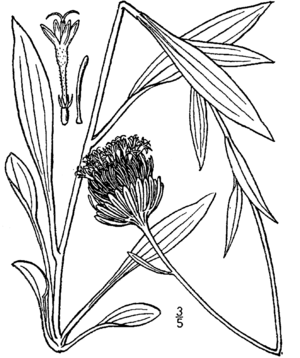Appalachian Barbara's buttons facts for kids
Quick facts for kids Marshallia grandiflora |
|
|---|---|
 |
|
| 1913 illustration | |
| Conservation status | |
| Scientific classification | |
| Kingdom: | |
| (unranked): | |
| (unranked): | |
| (unranked): | |
| Order: | |
| Family: | |
| Genus: | |
| Species: |
†M. grandiflora
|
| Binomial name | |
| †Marshallia grandiflora Beadle & F.E.Boynton 1901
|
|
Marshallia grandiflora, also known as the Appalachian Barbara's buttons, was a beautiful flowering plant that is now extinct. This means it no longer exists anywhere in the world. It belonged to the sunflower family, just like sunflowers and daisies! This special plant was only found in a small area of the Blue Ridge Mountains in North Carolina, Eastern United States.
Contents
About Appalachian Barbara's Buttons
This plant was endemic to a very specific area. It grew only in Henderson and Polk counties in North Carolina. Scientists last saw this plant in 1919.
What It Looked Like
Marshallia grandiflora was an herb that could grow quite tall. It reached up to about 90 centimeters (or 3 feet) in height. Most of its leaves grew in a bunch near the bottom of its stem. Each plant usually had one or two flower heads. These heads were made up of pretty pink disc flowers. Unlike some other flowers in the sunflower family, it did not have any ray flowers. Ray flowers are the petal-like parts you see on a daisy.
Where It Lived and Why It Disappeared
This unique plant loved to grow along sandy and gravelly riverbanks. These areas were often found along fast-flowing rivers. Sadly, changes to these special river habitats caused the plant to disappear. Because it only lived in such a small and particular place, it was very sensitive to changes. This made it easier for the species to become extinct.
Related Plants
For a long time, Marshallia grandiflora was thought to be the same species as another plant called M. pulchra. M. pulchra is also known as the beautiful Barbara's buttons. It grows in the central Appalachia region. This area stretches from southwestern Pennsylvania to eastern Tennessee. The biggest group of M. pulchra plants lives along the Gauley River in West Virginia.
However, a study in 2020 found that these two groups of plants were actually different species. So, the plants in North Carolina kept the name M. grandiflora. The plants in the Central Appalachian region were given the new name M. pulchra. Both of these species are closely related to each other. They are also related to another plant called M. legrandii. Just like M. grandiflora faced threats, M. pulchra is also in danger from changes to its habitat.
 | Emma Amos |
 | Edward Mitchell Bannister |
 | Larry D. Alexander |
 | Ernie Barnes |


